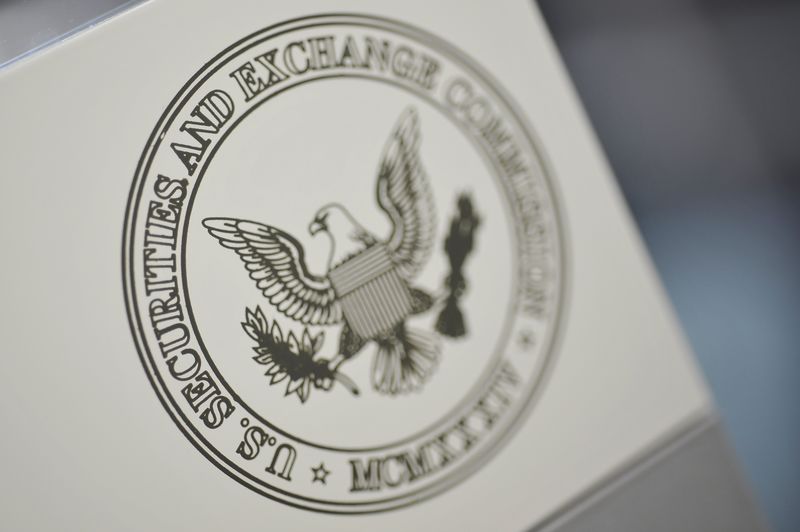By John McCrank
NEW YORK (Reuters) - The U.S. Securities and Exchange Commission is convening a group of financial industry veterans for the first time next month to consider stock market reforms, but one group will be conspicuously absent: retail brokerages.
The SEC's 17-member Market Structure Advisory Committee includes representatives of fund companies, an exchange, off-exchange trading venues, dealers, and academia, among others. The group, which meets four times a year, will review old rules, and advise the SEC on a range of new regulations designed to make sure the market is as stable and fair as possible.
Still, given that the SEC has said its main priority is to protect retail investors, the omission of retail brokers raises questions, because without their point of view the panel may recommend changes that favor institutional investors, analysts said. Retail investors place around 16 percent of all U.S. stock orders.
"There's a missing gap of protecting retail order flow," said Larry Tabb, chief executive of capital markets advisory firm TABB Group.
That gap was also noticed by committee member Joseph Ratterman, president and chairman of No. 2 U.S. exchange operator BATS Global Markets. He said he mentioned his concern to SEC Chair Mary Jo White shortly after the committee was announced and that she asked him, along with committee member Jamil Nazarali, from market making firm Citadel Securities, to formally represent retail interests.
Citadel and BATS do not directly interact with retail investors, and their interests sometimes diverge from retail brokers'.
The SEC declined to comment, and hasn't said how it chose the committee members.
The major retail brokerages, including Charles Schwab Corp (N:SCHW), TD Ameritrade (N:AMTD), E*Trade (O:ETFC), Fidelity and Scottrade, also declined to comment on the record.
Once the regulator made the names of the panel public, some retail brokerages began lobbying for a seat at the table, but were told that the process would not be restarted, according to people familiar with the matter who did not have permission to speak publicly.
"We were kind of shocked," said a senior executive at one retail brokerage. "I mean, if you're going to talk about market structure and how it impacts investors, you might want to have someone who deals with retail investors."
The SEC told the retail brokers that they will have opportunities to post public comment letters on the issues discussed by the committee and that the firms would also be included in separate roundtable discussions on market structure issues, the executive said.
In the meantime, the firms will use the retail advisory committee formed by BATS and Citadel will serve as their proxy.
"If you're not going to be part of the club, you've got to have somebody that at least is going to express your point of view at the club meetings," the executive said.
FILLING IN THE GAP
Ratterman and Nazarali said they plan to meet with senior executives from Schwab, TD Ameritrade, E*Trade, Fidelity and Scottrade before and after each of the committee's meetings to solicit their views, which they will pass on to the broader group.
"It's one of many voices, but it's always going to be a significant voice," Ratterman said of the retail point of view.
In addition, Citadel is having discussions with its other clients to ensure the firm can properly represent the industry on market structure issues, Nazarali said.
"We believe it is important to create a level playing field for all investors," he said. "This retail advisory committee enables us to continue advocating on behalf of firms of all sizes."
One recent example of a proposed SEC rule that retail brokers say will harm investors is the so-called "tick-size pilot" which would apply to shares of a large set of smaller companies. Once in effect, brokers will have to sell each share of these companies at prices at least a nickel higher than where they buy them, instead of the penny difference currently required.
That wider gap gives brokers higher profits, which in theory will make it more worth their while to take the other sides of trades for investors, making it easier to complete transactions in these thinly traded stocks.
But those benefits might mean more to big investors, who might look to sell large numbers of shares at once, than to small investors. Individual investors typically make smaller trades, and being forced to buy at prices that are a nickel-a-share higher than where they can sell could amount to their paying a sort of tax to the broker.
Schwab said in a letter to the SEC that the program would ultimately result in a "wealth transfer" from retail investors to stock exchanges and middlemen. Fidelity also said in a letter to the regulator that it does not support the plan.
The potential cost of the program to all investors could be up to $455 million dollars annually, TD Ameritrade said in a letter to the SEC in December. The No. 1 retail broker by client trading volume estimated the potential cost to its customers between $11 million and $18.4 million.
